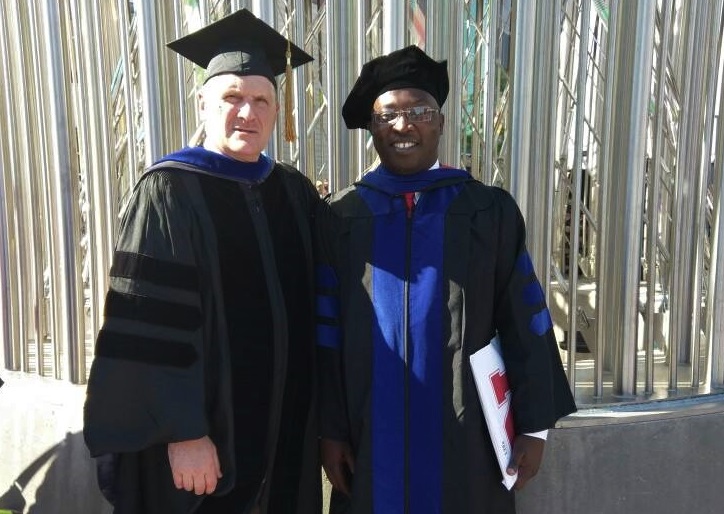
Headed home a Husker: scholar's time at Nebraska positive for all
Robert Mugabi, of Uganda, wrapped up his multi-year stay at the University of Nebraska-Lincoln (UNL) attending the commencement exercises earlier this month, having been awarded the degree of Doctorate of Food Science and Technology.
“UNL exceeded my expectations,” said Mugabi, who will return to his position in the Makerere University’s department of Food Technology and Nutrition in Kampala. With the degree, he will now be able to compete for research grants and mentor both undergraduate and graduate students back in his department. “With the training I have gained here at UNL, I hope to be a useful human resource for my country.”
Mugabi, whose research focused on improving local milling operations in Uganda for safer and more consistent products, was able to pursue his studies at Nebraska by way of the Borlaug Higher Education for Agricultural Research and Development (BHEARD) program, which he began in August 2013. The BHEARD program supports long-term training of agricultural researchers at the master’s and doctoral levels and links scientific and higher education communities in Feed the Future countries and the United States. Established as a part of a partnership between the United States Agency for International Development (USAID), the Association of Public and Land-grant Universities (APLU) and the International Maize and Wheat Improvement Center (CIMMYT) in Mexico, the BHEARD program is implemented by Michigan State University, which sends fellows’ applications to select institutions in the United States. Faculty at these institutions may then select a fellow who appears to be an appropriate match for their field of study and research interests. In this case, Dr. Curtis Weller, Department Head of Food Science and Technology and Director of The Food Processing Center, selected Mugabi’s application and proceeded to serve as his adviser during the course of his studies at UNL.
“My adviser, Dr. Weller, always encouraged me to think critically and take control over and responsibility for my research. I have learnt a lot and grown academically through his mentorship. I can’t thank him enough,” Mugabi said.
Weller was equally positive about the experience, noting the mutually beneficial situation of hosting an international scholar. “The relationships he built with other graduate students, with undergraduates and different researchers—it helps educate them a little bit that the world is a big place, and you don’t do things the same in all these different places. To some degree you don’t want to do that,” said Weller. “There are good things there, there are good things here, and we can have this mutual exchange, this mutual understanding of people experiencing the world in different ways. It’s dangerous to think the way you’re doing things is always the right way of doing things.”
IANR’s Office of Global Engagement has been working closely with faculty to secure grants and awards through programs like USAID BHEARD and USDA Foreign Ag Service’s Borlaug and Cochran Fellowship Programs. These programs bring talented students, scholars, and decision-makers from around the world to Nebraska. This global meeting of minds takes on much more significance and urgency when considering the areas in which IANR engages, like global food security. In an ever-smaller, interconnected world, the struggles of one region or nation rarely remain isolated for long; extreme events like drought and crop failure often lead to sudden extreme exodus of populations from rural to urban areas, which can lead to conflict, unrest and other negative outcomes that quickly touch all corners of the globe.
IANR’s Assistant Vice Chancellor for Global Engagement, Josh Davis, says that IANR values the opportunity to bring talented students and scholars like Robert to Nebraska. “We are strongly committed to global engagement. This includes preparing our students to have an impact in our interconnected world and positioning our faculty to conduct research and engage with their peers so they can help create solutions to the great challenges of our time, like how to feed a growing world population with limited resources.”
Weller added, “My feeling is that sometimes you have to put into context why we have a university. Why are we educating people? Is it just simply to get a job, or do we want to think about where they fit in the world? That’s part of what I view as a great benefit—he (Mugabi) gets to come here and see the way we, for good or for bad, see the world, what we do in the world, and at the same time, we get to understand that (from his perspective).”
For more information about current visiting scholars or hosting a scholar in the future, please contact IANR Global Engagement Coordinator, Liana Calegare at lcalegare2@unl.edu.
By Brianne Wolf | Program and Outreach Associate, Institute of Agriculture and Natural Resources-Global Engagement